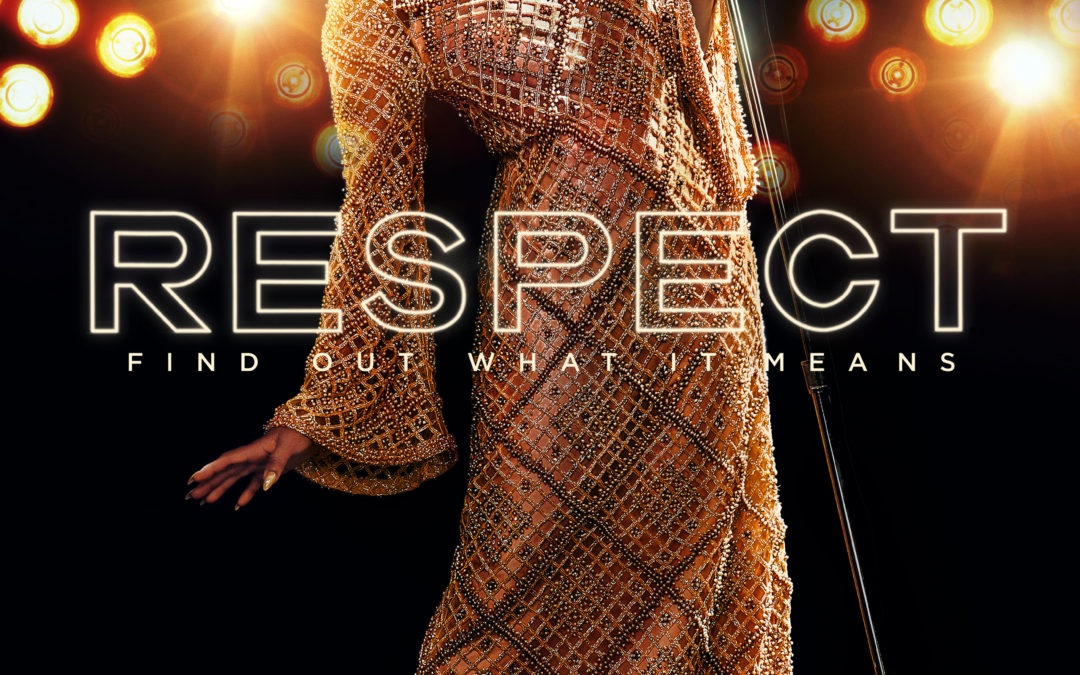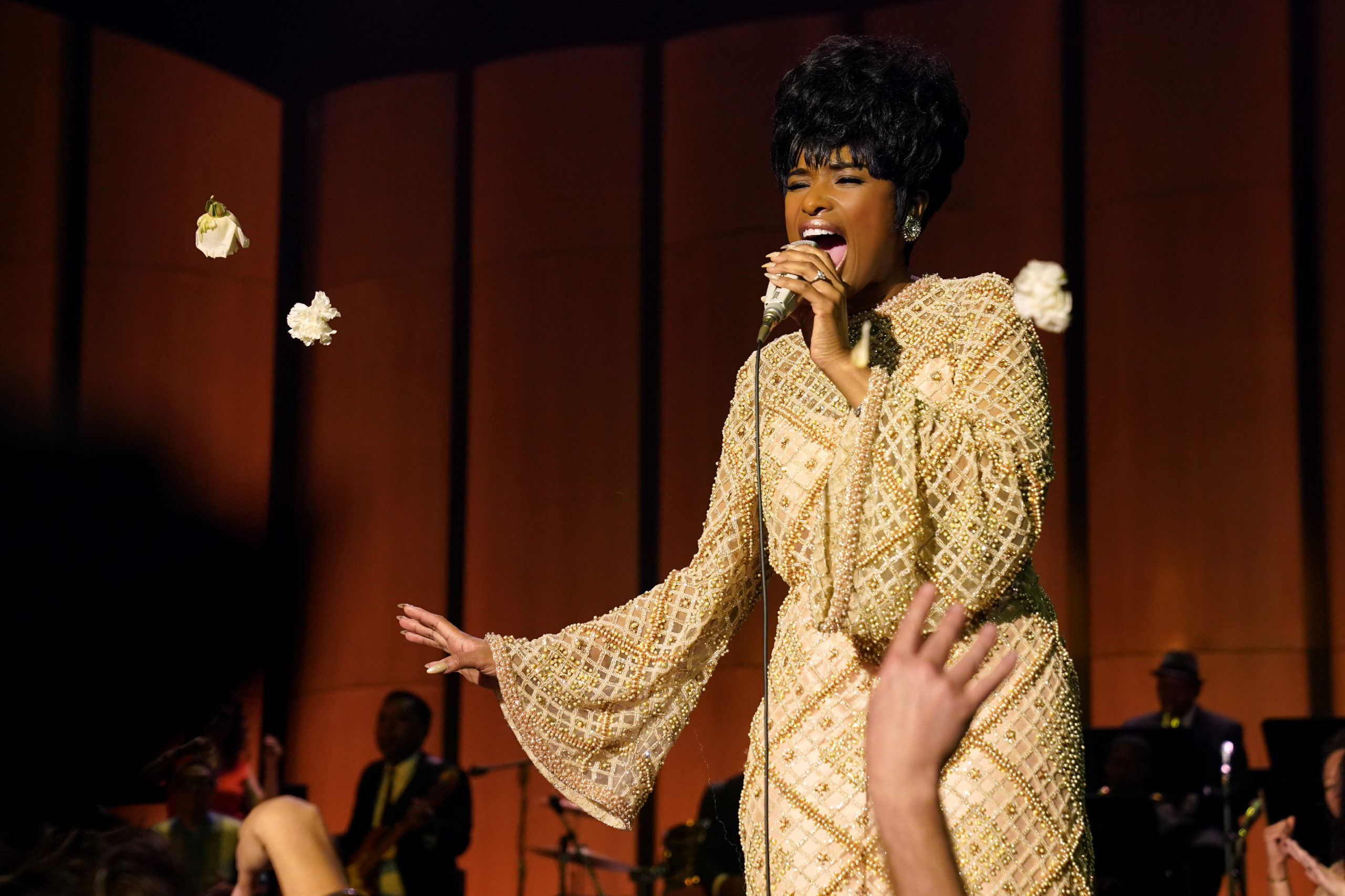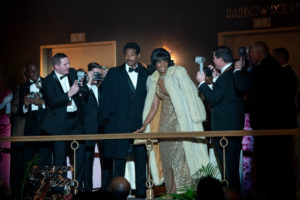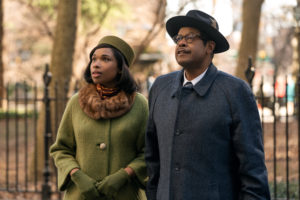
RESPECT: An Interview with Jennifer Hudson
UF Jennifer Hudson Interview

RESPECT is the film adaptation of the life story of Aretha Franklin, the Queen of Soul. Aretha Franklin is known by many as the one of the greatest singers and artists who ever lived. Her career spanned decades, crossed and dominated multiple genres, and garnered the most prestigious awards and honors. Her personal life was deeply complex, but her ability to articulate the depth of human experiences through music could not be clearer. RESPECT tells the story of Aretha Franklin’s journey of faith and finding her voice. UrbanFaith sat down with Jennifer Hudson, the star of the film who portrays Ms. Franklin to discuss the themes of faith, Gospel, and how to find our voices from the film. Full audio interview is linked above, the text of the interview below has been edited for clarity.
Allen
My first question for you after seeing the movie is about faith. Of course, it has so much faith in it. And a lot of the movie is about Aretha’s faith. What role did you see faith playing in that movie, and in your work with it?
Jennifer
Oh, it was mandatory. So that was the main thing, I was determined to make sure this was present. If my executive producer credit counts for anything, if I could add one thing, it was the Gospel. and I was like, we got to have a Gospel, you gotta have a thing. You gotta have faith. I don’t care what she’s singing or what’s happened in her life, THAT has always got to be present. It’s the same for me as well. For Aretha as well as for me.
Allen
And it seemed like it was really well presented as a story of redemption, you know? And why do you think that’s important for people to see, especially in a time like this, where there’s so much chaos, to hear these stories of hope out of that?
Jennifer
I think it’s even more impactful and powerful when it comes from someone like a legend and icon. But people don’t think that they go through real life things. And I look at it almost as if this is kind of like her testimony in a way; to see her struggle, go through life, be human, and still prevail. That’s a testimony. You know what I mean? And it inspired me. Yeah. And I think it would inspire so many others, because it’s to me misleading to let people think you just get what you want, or nothing’s going to happen, you’re not going to face anything. So when you get to see the life, the human, the person, you know, it kind of puts it in perspective, you know, and I don’t know how anyone would not find that inspiring.

(ctr) Marlon Wayans stars as Ted White and Jennifer Hudson as Aretha Franklin in RESPECT A Metro Goldwyn Mayer Pictures film Photo credit: Quantrell D. Colbert
Allen
Yeah, I really appreciated how complex all the characters were. I mean, you did a phenomenal job bringing Aretha and all her complexity out. But I thought that was the case across the board for the cast, how did you prepare to try to embody all that complexity over years?
Jennifer
That was another challenge, because it’s kind of overwhelming. When you think of Aretha, like she has decades and decades of a career. And it’s like, just trying to condense the music alone, eight albums before a hit. Okay? That’s one thing. Then you think of the life. Then you think of the people that were in her life. Then you think about what was going on in her life. What part of the story do you tell? But I think that was more of a challenge for Tracy, and the writer, I’m like, how are they gonna be able to… I don’t want to say condense…but get it all in? Because it’s such a powerful story in every capacity.
Allen
And it did tell this story that ended with Gospel that began with Gospel and her relationship with the church. What is some good news that you feel like the world needs from this film?
Jennifer
Um, I would say… my God, there are so many things. If I had to narrow it down to one, what would it be? I was gonna go to the base of her trusting her voice, and finding your own [voice], because it wasn’t until she owned hers, that we got our Queen of Soul. You know, to me, if we all took the time to do that within ourselves; what’s in there? [What’s] here to share with the world as our gifts? You know what I mean? So it makes you kind of want to relook at yourself. At least for me, it did. And encouraged me to want to…trust my own voice, path, experiences, and it shows things will prepare you for [what’s] next. But I kind of see things differently from everyone else. But I do think there’s something in [the movie] for whoever the viewer is, it’s just a matter of what you need, what you’re looking for.
Allen
Finding Her voice was something that really stood out to me as she had to deal with so many people trying to control her voice. And I want to know, what advice would you give to a young person young woman or a young adult about how to find their voice?
Jennifer
Wow. One, not to give it away. Because that can happen. And I think we take our voice for granted. And what I mean by that, is you may have a voice, but are you using it?
You know? And to me, that’s the trickiest part. Because yes, I have a voice. But is it telling my story? It should tell your story. It’s should speak of your experiences. We all have a story to tell. And we can only tell that story through our voice. So that’s what I mean by don’t give it away. Because it can happen unconsciously. It’s like, when I speak what am I speaking for myself? Am I speaking from my truth? Am I speaking from my experiences? Or am I going through the motions of what someone else would have me to do? And you could get confused by that by using your… the sound of your voice. But are you speaking for yourself? That’s when it gets tricky.

Jennifer Hudson stars as Aretha Franklin and Forest Whitaker as her father C.L. Franklin in RESPECT A Metro Goldwyn Mayer Pictures film Photo credit: Quantrell D. Colbert
Allen
It does. One of the things that I appreciate, though, is that she had to figure out that people were for her. I want to know, how is it that the community has helped shape you, as you’ve taken this on?
Jennifer
Oh, my God…wow, that’s a good question. It’s been a… it’s been what is needed to be when it’s needed to be that. You know what I mean? When I need a push it’s there, like right now [there’s] so much love. So much support even when I don’t see things the way…it appears? That encouragement is there. That support is there, that I love is there, which is needed right now. Or when times are down. There are people are like, come on, keep going, keep pushing. So it varies depending on the situation. But [there are things that are there ] to teach you tough lessons, too. So again, it varies.
Allen
Absolutely. And so again, a last word for any young adult, especially young adult faith, trying to figure out how can they get to success. You’ve accomplished so much. What is the advice that you would give trying to figure out how to be successful?
Jennifer
Well, one, no one knows your potential the way you do. And if people don’t see your dream and your vision, it’s only because they don’t dream as big as you do. And nothing is JUST that. [People say] “oh, that’s just this, this just that.” Well, honey, just singing the tribute got me right here today. You know what I’m saying? So I’m trusting that. And if you keep at something, it has no choice but to give. And NEVER…this is what I told myself after Idol before Dreamgirls. After I was eliminated from American Idol…and I really want to share this with this community. When I started out, I was like “I’m gonna win.” And people were like, “Well, what if you don’t? What if you don’t win?” So I started believing them.
And that’s when I started to say, “I’m gonna do it for the experience.” And I let them talk me out of my faith. I let them interrupt that faith. So when Dreamgirls comes around and someone wants to say something that wasn’t in my train of thought I said, “No, I will not interrupt my faith. This is mine and I’m sticking with it.” And I learned that lesson. That’s what I mean by nothing is “just.” So even when it’s an experience that didn’t turn out the way you wanted it to [turn out]…it can still prepare you for the next thing. Because by the time the Dreamgirls opportunity rolled around, I learned from that experience. Allowing people to interrupt my faith? No, no. That’s what went wrong the last time! [Instead I said] I’m ready God, I believe it, I accept it. I’m not concerned with what [anyone else] got to say and [they] will not interrupt my faith. Don’t allow someone to interrupt your faith. I want to leave it with that.
Allen
Thank you so much!
Jennifer
Thank you for having me!


 It was soon proven otherwise, but Don Cornelius through Soul Train, told me I was a good dancer. Every Saturday morning after cartoons went off, feeling like a grownup, I’d tune in to move to the music any kind of way just like the Soul Train dancers. Going down
It was soon proven otherwise, but Don Cornelius through Soul Train, told me I was a good dancer. Every Saturday morning after cartoons went off, feeling like a grownup, I’d tune in to move to the music any kind of way just like the Soul Train dancers. Going down  I am very saddened by the death of Don Cornelius, a black legend! Back in the ’70s and ’80s before the dominance MTV or BET, there were very few outlets to see my favorite R&B acts like Michael Jackson, New Edition, or DeBarge perform on television. Since my parents were pretty conservative at the time, I wasn’t allowed to watch Soul Train but as a lifelong R&B and pop culture aficionado, I found ways to watch this great show without “technically” breaking the rules. I wasn’t allowed to go inside of childhood friends’ homes either unless my parents knew their parents. I remember I had one friend who allowed me to literally sit on the pavement outside of her apartment. We would speak to each other through the open window, and if she happened to have Soul Train on the television behind her, who was I to say what she could watch inside her home? I remember that one light-skinned woman with extra long black hair that whipped around her body (pre-Willow Smith) as she danced on what seemed like nearly every episode for years! I couldn’t wait until I got a perm so I could whip my hair around like that! A towel wrapped around my head sufficed until I finally got a perm. I remember all of the fresh dance moves that would not be duplicated on American Bandstand, even though I was a fan of that show too. Simply put, there was nothing else like that show at that time, an oasis of black grooves and moves in a desert of white programming. RIP Don Cornelius … —
I am very saddened by the death of Don Cornelius, a black legend! Back in the ’70s and ’80s before the dominance MTV or BET, there were very few outlets to see my favorite R&B acts like Michael Jackson, New Edition, or DeBarge perform on television. Since my parents were pretty conservative at the time, I wasn’t allowed to watch Soul Train but as a lifelong R&B and pop culture aficionado, I found ways to watch this great show without “technically” breaking the rules. I wasn’t allowed to go inside of childhood friends’ homes either unless my parents knew their parents. I remember I had one friend who allowed me to literally sit on the pavement outside of her apartment. We would speak to each other through the open window, and if she happened to have Soul Train on the television behind her, who was I to say what she could watch inside her home? I remember that one light-skinned woman with extra long black hair that whipped around her body (pre-Willow Smith) as she danced on what seemed like nearly every episode for years! I couldn’t wait until I got a perm so I could whip my hair around like that! A towel wrapped around my head sufficed until I finally got a perm. I remember all of the fresh dance moves that would not be duplicated on American Bandstand, even though I was a fan of that show too. Simply put, there was nothing else like that show at that time, an oasis of black grooves and moves in a desert of white programming. RIP Don Cornelius … — I’ll never forget Soul Train, from the chugging train at the intro to the various incarnations of the Soul Train dancers. Don Cornelius made this show an institution that definitely shaped the culture and gave us memorable performances on the stage and dance floor.
I’ll never forget Soul Train, from the chugging train at the intro to the various incarnations of the Soul Train dancers. Don Cornelius made this show an institution that definitely shaped the culture and gave us memorable performances on the stage and dance floor. Being in a military family, every so often we’d get stuck in the boonies with no television we could relate to. When my dad got orders to a big urban city, we kids were ecstatic. It was my job to watch my younger siblings on Saturdays while my parents worked, and at the time when I announced SOUUULLL TRAINNNN is on, my brothers and sisters would run from outside like they’d lost their minds. Oh, and then the party was on. We bumped, spanked, wormed, or whatever the latest dance craze was, along with the hippest kids in America. If there had been just two or three more of us, we could have formed a Soul Train line right there in the living room. It grieves me to know that Don Cornelius couldn’t find another way; which serves to remind us that we must get the word out about the only One who can bring us out of our troubles, the only One Who can bring us out of the lies that Satan tells us when we see no way out. There is a world of hurting people who don’t really know Him. Someone needs to tell them. We need to tell them.
Being in a military family, every so often we’d get stuck in the boonies with no television we could relate to. When my dad got orders to a big urban city, we kids were ecstatic. It was my job to watch my younger siblings on Saturdays while my parents worked, and at the time when I announced SOUUULLL TRAINNNN is on, my brothers and sisters would run from outside like they’d lost their minds. Oh, and then the party was on. We bumped, spanked, wormed, or whatever the latest dance craze was, along with the hippest kids in America. If there had been just two or three more of us, we could have formed a Soul Train line right there in the living room. It grieves me to know that Don Cornelius couldn’t find another way; which serves to remind us that we must get the word out about the only One who can bring us out of our troubles, the only One Who can bring us out of the lies that Satan tells us when we see no way out. There is a world of hurting people who don’t really know Him. Someone needs to tell them. We need to tell them. Despite being a child of the late 70s and 80s, I didn’t have many actual experiences of watching Soul Train. Most of my memories regarding Soul Train were at various school dances and wedding receptions growing up, when folks would start up “the soul train line” and line up to cut a step. Most of the influence of Soul Train I witnessed were in derivative television shows (like
Despite being a child of the late 70s and 80s, I didn’t have many actual experiences of watching Soul Train. Most of my memories regarding Soul Train were at various school dances and wedding receptions growing up, when folks would start up “the soul train line” and line up to cut a step. Most of the influence of Soul Train I witnessed were in derivative television shows (like  As a girl growing up in small-town New Jersey in the 1970s, my primary exposure to black culture was Soul Train, and oh how I loved Soul Train! It was sandwiched between Saturday-morning cartoons and Saturday-afternoon roller derby on our television station. It never occurred to me that by introducing me to some of that era’s best music and most accomplished musicians, Don Cornelius was drawing me into a richly textured world that was not available to me then. I just knew I loved hearing his smoky voice and dancing to the sounds of soul. It saddens me deeply to learn that, like my son, this gifted man apparently died by suicide. I’m reminded that depression and despair don’t only visit the downtrodden, but even the most accomplished among us. My thoughts and prayers are with his family. —
As a girl growing up in small-town New Jersey in the 1970s, my primary exposure to black culture was Soul Train, and oh how I loved Soul Train! It was sandwiched between Saturday-morning cartoons and Saturday-afternoon roller derby on our television station. It never occurred to me that by introducing me to some of that era’s best music and most accomplished musicians, Don Cornelius was drawing me into a richly textured world that was not available to me then. I just knew I loved hearing his smoky voice and dancing to the sounds of soul. It saddens me deeply to learn that, like my son, this gifted man apparently died by suicide. I’m reminded that depression and despair don’t only visit the downtrodden, but even the most accomplished among us. My thoughts and prayers are with his family. —  I remember
I remember  Sitting in my parents’ living room, the back of my legs sticking to the plastic covering mom’s gold velvet couch, the funky music from the Jacksons, the Sylvers, and Joe Tex would blare from the black-and-white screen. I would fix my eyes on the Afro puffs, braids, wide brim hats and bellbottoms, imagining their psychedelic colors (mom and pops did eventually get a color TV) as they danced the funky chicken or the robot. As Jermaine sang, they would be “movin, she’s groovin. Dancin’ until the music stops now, yeah” down the Soul Train line. My older sister and brothers would bust all the moves, blocking my view of the TV along the way. But back then, when you were the baby brother, you just kept quiet and thankful that they let you hang out with them on Saturday morning. We were raised in a 12th floor apartment in The Tilden Houses (The Projects) in Brownsville, Brooklyn (NY). Watching Soul Train was more than a temporary escape from what was immediately outside the door, down an elevator that often stuck, or the stairwell that was owned by depressed brothers and sisters high on dope. Soul Train was a weekly, encouraging dose of positive black life, of people who were happy, talented, and free. And they looked like me. Mr. Cornelius, you did a great thing, sir. I pray that your soul has found the peace that you wished for us all. —
Sitting in my parents’ living room, the back of my legs sticking to the plastic covering mom’s gold velvet couch, the funky music from the Jacksons, the Sylvers, and Joe Tex would blare from the black-and-white screen. I would fix my eyes on the Afro puffs, braids, wide brim hats and bellbottoms, imagining their psychedelic colors (mom and pops did eventually get a color TV) as they danced the funky chicken or the robot. As Jermaine sang, they would be “movin, she’s groovin. Dancin’ until the music stops now, yeah” down the Soul Train line. My older sister and brothers would bust all the moves, blocking my view of the TV along the way. But back then, when you were the baby brother, you just kept quiet and thankful that they let you hang out with them on Saturday morning. We were raised in a 12th floor apartment in The Tilden Houses (The Projects) in Brownsville, Brooklyn (NY). Watching Soul Train was more than a temporary escape from what was immediately outside the door, down an elevator that often stuck, or the stairwell that was owned by depressed brothers and sisters high on dope. Soul Train was a weekly, encouraging dose of positive black life, of people who were happy, talented, and free. And they looked like me. Mr. Cornelius, you did a great thing, sir. I pray that your soul has found the peace that you wished for us all. — 